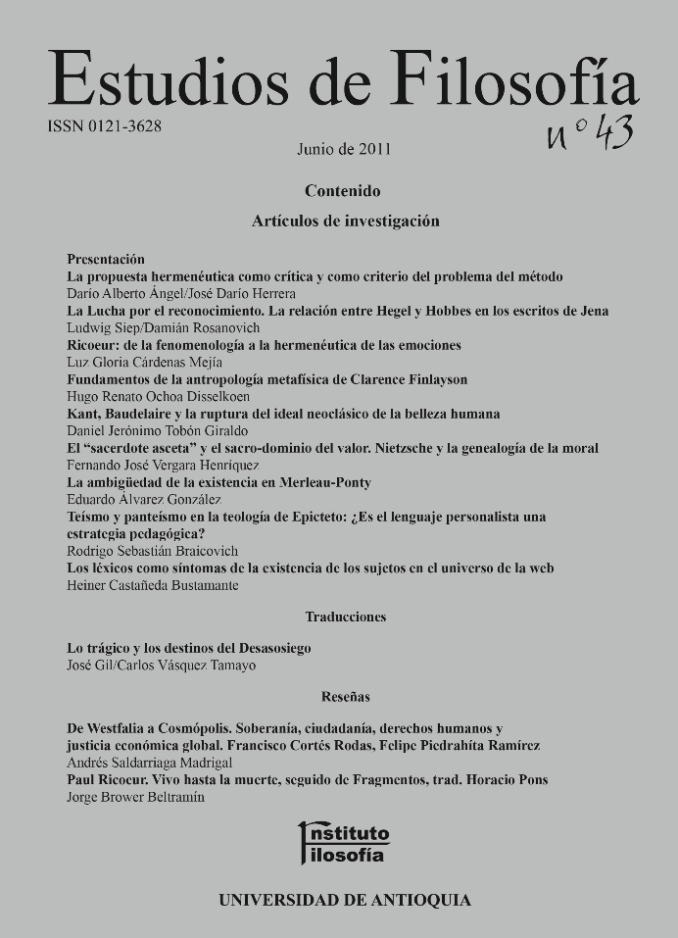The ambiguity of existence in Merleau-Ponty
DOI:
https://doi.org/10.17533/udea.ef.11573Keywords:
Merleau-Ponty, existence, ambiguity, cogito, subjectivity, body, phenomenologyAbstract
The actual piece deals with the new sense conferred to Human Existence by Merleau-Ponty, that as it simultaneously recognizes its belonging to the world according to the heideggerian notion of beingin the-world and from a viewpoint that opposes Rationalist Intellectualism, nevertheless does not renounce a Philosophy of the Subject inspired in the later Husserl. This approach leads Merleau-Ponty to interpret the Cartesian Principle of cogito as Existence, and to attribute to this notion an ambiguity: that which corresponds to the double and simultaneous consideration of belonging to the world and being differentiated from it. This philosophical project is elaborated through a new way of describing experience in the line of a Phenomenological Conception which attributes to the Body the transcendental role that Classical Idealism assigned to Conscience
Downloads
References
MERLEAU-PONTY, M (1975) Fenomenología de la percepción, Barcelona, Península.
MERLEAU-PONTY, M. (1945) Phénoménologie de la perception, Paris, Gallimard.
MERLEAU-PONTY, M. (1964a) Le visible et l’invisible, Paris, Éditions Gallimard.
MERLEAU-PONTY, M. (1964b) Signos, Trad. Caridad Martínez y Gabriel Oliver, Barcelona, Seix Barral.
MERLEAU-PONTY, M. (1967) Structure du comportement, Paris, P.U.F.
Downloads
Published
How to Cite
Issue
Section
Categories
License
Copyright (c) 2011 Eduardo Álvarez González

This work is licensed under a Creative Commons Attribution-NonCommercial-ShareAlike 4.0 International License.
Authors who publish with this journal agree to the following terms:
1. The Author retains copyright in the Work, where the term "Work" shall include all digital objects that may result in subsequent electronic publication or distribution.
2. Upon acceptance of the Work, the author shall grant to the Publisher the right of first publication of the Work.
3. The Author shall grant to the Publisher a nonexclusive perpetual right and license to publish, archive, and make accessible the Work in whole or in part in all forms of media now or hereafter known under a Creative Commons Attribution-NoCommercia-ShareAlike (CC BY-NC-SA 4.0), or its equivalent, which, for the avoidance of doubt, allows others to copy, distribute, and transmit the Work under the following conditions: (a) Attribution: Other users must attribute the Work in the manner specified by the author as indicated on the journal Web site;(b) Noncommercial: Other users (including Publisher) may not use this Work for commercial purposes;
4. The Author is able to enter into separate, additional contractual arrangements for the nonexclusive distribution of the journal's published version of the Work (e.g., post it to an institutional repository or publish it in a book), as long as there is provided in the document an acknowledgement of its initial publication in this journal;
5. Authors are permitted, and Estudios de Filosofía promotes, to post online the preprint manuscript of the Work in institutional repositories or on their Websites prior to and during the submission process, as it can lead to productive exchanges, as well as earlier and greater citation of published work (see The Effect of Open Access). Any such posting made before acceptance and publication of the Work is expected be updated upon publication to include a reference to the Estudios de Filosofía's assigned URL to the Article and its final published version in Estudios de Filosofía.















